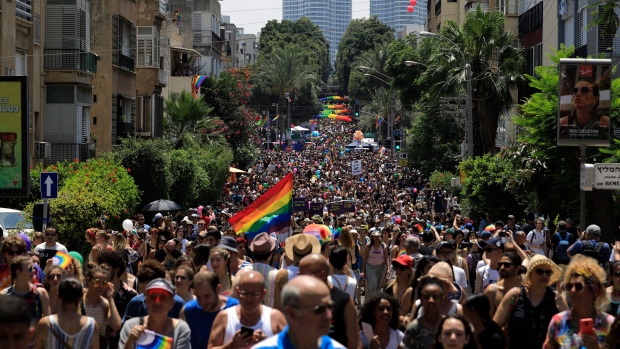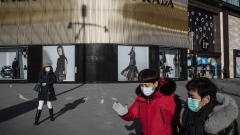Jun 26, 2019
Two great LGBT travel destinations that might surprise you
, Bloomberg News

At Bloomberg Pursuits, we love to travel. And we always want to make sure we’re doing it right. So we’re talking to globe-trotters in all of our luxury fields—food, wine, fashion, cars, real estate—to learn about their high-end hacks, tips, and off-the-wall experiences. These are the Distinguished Travel Hackers.
Amit Paley, 37, is head of the Trevor Project, a charity that focuses on at-risk LGBTQ youth. This year the group will be one of the five grand marshals for New York’s Pride March, which is celebrating the 50th anniversary of the Stonewall uprising in addition to welcoming WorldPride to America for the first time.
Before taking his current position, however, Paley logged stints as a McKinsey consultant and a journalist with the Washington Post, where his roles included working as a foreign correspondent based at the newspaper’s Baghdad bureau; his work there was nominated for a Pulitzer Prize.
His favorite airline is United. “They are actually a huge supporter of the Trevor Project, and they just announced nonbinary-gender booking options. So if you don’t identify as Mr. or Ms., you can identify as Mx., which is a pretty progressive thing to do,” Paley says. He flies about 150,000 miles per year, between his offices in Washington, D.C., Los Angeles, and New York; to his fiancé’s hometown of Toronto; and internationally.
Paley and his fiancé, Jonathan, live in New York City.
In extreme travel situations, think local.
The most important thing I did in a war zone to keep myself safe was to surround myself with people who were local and so had a much better sense [of the situation] than I did. In Iraq, for example, there were a number of people who essentially hired mercenaries from other countries. But at the Washington Post we did not do that—all our security were local Iraqis. There is no substitute for talking to people who actually live in that community, about what their advice and tips would be. That really applies to anywhere you travel in the world.
Don’t just pack an adapter—add this gizmo to your travel arsenal, too.
I always try to take multiple chargers, as I have so many devices. But when I was in Iraq, I bought an office extension cord—I forget how long it was, but it felt like it was 100 yards. You could plug it in anywhere. So if you wanted to plug something in to charge it but didn’t want to leave an expensive device somewhere far away, I could use that really long cord. In a hotel context, when I was backpacking in Southeast Asia, the hostel room could meander in weird ways, and I could use that then, too.
As a war correspondent he unearthed unlikely vacation destinations, like this corner of Iraq.
I spent time in the Kurdistan region of northern Iraq when I was a reporter, and it was a beautiful mountainous area that seemed a world apart from the war-ravaged parts of the country in the south. Actually, it’s relatively safe, and Erbil, for example, is an interesting city to visit. Just walking down the streets you can get a sense of the history there. I wouldn’t be surprised if, in 20 years, it’s visited as much as parts of Southeast Asia that were previously off-limits.
If you want to pack even lighter, borrow essentials from your hotel.
At the start of my time at McKinsey, I traveled an enormous amount, and I would travel sometimes to the same city every single week for months at a time. When I stayed at the same hotel, I realized they actually had things that I did not need to bring with me, that they would just loan me. For instance, at the Westin Pittsburgh, where I stayed all the time, guests can get a gym pack of shirts, shorts, and socks from the hotel.
One LGBTQ destination that might surprise you …
I love Venice, especially the hotel Ca’ Maria Adele. It has personal importance to me, because it’s where I got engaged to my fiancé. I planned a surprise trip, told him we were going somewhere but didn’t tell him where, then proposed in a gondola. The gondolier that we had was this very, very gruff machismo kind of gondolier, so I was a little nervous about what his reaction would be when I proposed. But he almost kind of shrieked congratulations and wanted to take a million pictures of us. He was such a sweetheart about it. And one more entry in the, you know, don’t judge a book by its cover.
And another …
Tel Aviv. My mother is Israeli, and I grew up going to Israel every summer, and to Tel Aviv all the time. But I had never heard anyone in Israel ever talk about LGBTQ people, and I was not out until the end of college. So as an out person, to come back with my fiancé and see how accepting and supportive this city is, it was really inspiring. I wish the younger version of me had known it was such a surprising beacon for LGBTQ people. Almost anywhere you go on the beach in Tel Aviv, I think, you can see them. And there are so many great bars and clubs—I love Shpagat.
On his post-graduation cross-country road trip, two states stood out—for very different reasons.
After I graduated from school, I had four or five months before I was starting my new job, so I wanted to do a big road trip across the U.S. The two most surprising things I learned: Utah is the most beautiful state in the union by far, bar none, which I was not expecting. The different parks all look like you’re on a different planet. And I didn’t book hotels ahead of time, just found places the night of. And that worked fine in every place, except one state, the one I would’ve least expected: North Dakota. I literally could not find a place to sleep in the entire state. At that time there was an energy boom in North Dakota, and they had seasonal workers, so they were occupying literally every room. So don’t think that because somewhere is an unpopulated area, or not a heavy tourist destination, that there aren’t other people traveling who might book up every hotel room that exists.
Worried about missing a flight? Book a backup seat.
I used to get to the airport very, very early, but when I started taking 6 a.m. flights to Pittsburgh, that changed. I made a calculation of what the very, very latest I could arrive would be and added 15 minutes of buffer time. I’ve missed flights less times than I can count on a hand. And someone told me this tip: Every single flight they take, they always book a second flight, just in case they miss the first one. It’s expensive, he said, but he always gets to where he’s going on time. At McKinsey, too, if there was ever bad weather, we would book multiple flights in case the one we were on was canceled. If you book an expensive, refundable second seat like that, you can actually cancel it [for free] if you don’t need it. Obviously, that’s a very expensive option, and we work at a nonprofit, so we don’t do that here.


